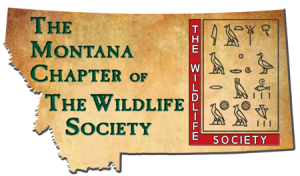Montana Chapter Annual Conference
Coordination and Collaboration in Conservation
Holiday Inn Downtown,
Missoula, MT
February 23-27th, 2026
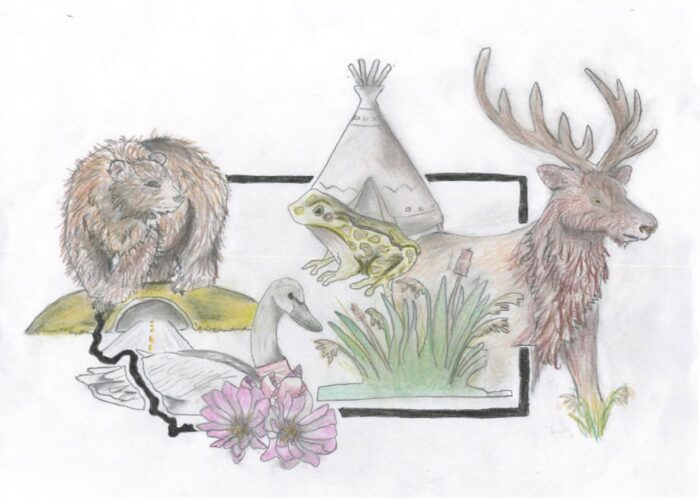
We all know that wildlife don’t follow jurisdictional boundaries. We’ve watched the effects of Climate Change impact the environment, regardless of whether the land is Tribal; State; Federally; or Privately owned. And while seeking food, a bear may be looking for a loaded serviceberry bush, but we know they won’t pass up on a household garbage can or an unsecured chicken coop.
In the wildlife and habitat conservation field, the issues we face are often complex and the scope lies beyond any single management boundary. We rely on effective coordination with one another, across jurisdictions and legal boundary lines, to make the greatest impact on wildlife and their habitats. By working together, we can pool resources, expertise, and funding to have a larger impact than any one entity could, alone. For example, regional research and monitoring efforts on Threatened and Endangered species like the North American Wolverine, or Canada Lynx. Data collected across a larger landscape, supplied by multiple State; Tribal; Federal; and Non-Profit agencies, can help researchers model more accurately and provide important insights into species recovery and conservation.
Coordinating habitat management between agencies can also improve landscape consistency. Coordinated burning schedules and water delivery, even weed spraying can increase the impact of any single effort. Wildlife agencies working with non-profit organizations have also helped to secure important habitats through conservation easements. This can help protect larger landscapes, by protecting important travel corridors and connecting already protected habitat complexes.
Another element of this collaboration that we can’t forget to highlight, are the wonderful people in the communities that we live in! They are the stakeholders that share the landscape with wildlife, who also enjoy a healthy ecosystem. They recreate, and are also the volunteers that help count birds and collect important data for programs like the Montana Bee Atlas! We know that our work doesn’t happen in a vacuum, and it takes careful coordination and collaboration to conserve wild spaces and their inhabitants.
In 2026, our Annual Conference of the Montana Chapter of The Wildlife Society will seek to honor one another and celebrate the incredible partnerships we have that enable us to achieve the great work that we all do! Keep up the great work!
.
Registration
Registration is now closed
We have reached capacity for the conference center and will not be accepting day of registration during the conference.
We apologize for going back on saying we would do so, but we are full. If you are presenting and have not yet registered, please reach out to the board.
Abstracts
The abstract submission period has now closed
Plenary:
Coordination and Collaboration in Conservation:
When managing wildlife means managing across jurisdictions and legal boundary lines
Brandon Kittson, Acting Director & Deputy Director, Blackfeet Fish & Wildlife Department
Hilary Cooley, United States Fish and Wildlife Service Grizzly Bear Recovery Coordinator
Kqyn Kuka, Tribal Liaison and Diversity Coordinator for Montana Fish, Wildlife and Parks
Molly McDevitt, Science Director of the Blackfoot Challenge
Neil Anderson, Montana Fish, Wildlife and Parks Region 1 Wildlife Manager
Whisper Camel-Means, Division Manager of Fish, Wildlife, Recreation and Conservation for the Natural Resources Department of the Confederated Salish and Kootenai Tribes
Workshops
Click the arrow toggles to learn more about each workshop
Authors: Will Janousek1*, Gavin Cotterill1, Tabitha Graves1
- U.S. Geological Survey, Northern Rocky Mountain Science Center, West Glacier, MT, USA.
*Presenter
Cost: Professional $35, Student $15
Time: Tuesday February 24, 9:00 AM -12:00 PM
Understanding how animal aggregation influences disease dynamics is essential for effective wildlife management. This workshop covers a suite of tools developed by USGS and partners that provide managers with flexible approaches to analyzing patterns and changes in aggregation. While the primary focus is on informing key components of chronic wasting disease (CWD) spread, these tools are applicable to other scenarios, such as human-wildlife conflict. The workshop will begin with a presentation by Dr. Janousek providing a conceptual overview of animal aggregation modeling, its relevance to disease ecology, and specific case study examples. This will be followed by approximately two hours of hands-on data exploration using common wildlife data types. Participants will engage with tools designed to analyze spatial and temporal patterns of animal behavior that may contribute to disease transmission. A working knowledge of program R (e.g., loading data, basic syntax) is recommended for full participation, though observers are welcome. Any use of trade, firm, or product names is for descriptive purposes only and does not imply endorsement by the U.S. Government.
Presenters: Sarah Sells¹, Hannah Sipe¹, Justin Gude²
¹U.S. Geological Survey, Montana Cooperative Wildlife Research Unit, University of Montana
² Montana Fish, Wildlife and Parks
Cost: Professional $35, Student $15
Time: Tuesday February 24, 1:00 PM -5:00 PM
This half-day workshop will introduce participants to the field of Structured Decision Making (SDM). SDM is a formal process for making decisions and is used widely in the field of wildlife management. Participants will learn the basic steps of the SDM process and hear about several case studies of its application in Montana.
Cost: free
Time: Tuesday February 24, 2:00 PM – 3:30 PM
Within walking distance from the conference venue, Boone & Crocket staff will guide participants through their Visitor’s Center gallery, as well as provide an overview of the Boone & Crockett Club! Come and learn about some of the great pioneers of conservation, and how they’ve been at the forefront of conservation in America.
Cost: $10
Time: Wednesday February 25, 10:00 AM -12:00 PM
Join a guided tour through the Missoula Butterfly House and Insectarium, which includes a tropical greenhouse filled with butterflies from across the world, as well as an exhibit area featuring a wide array of insects, arachnids, millipedes, centipedes, and crustaceans. The Missoula Butterfly House provides a truly unique experience. Come get your bug on!
Transportation will be on your own, Missoula has a free bus service.
Schedule at a Glance
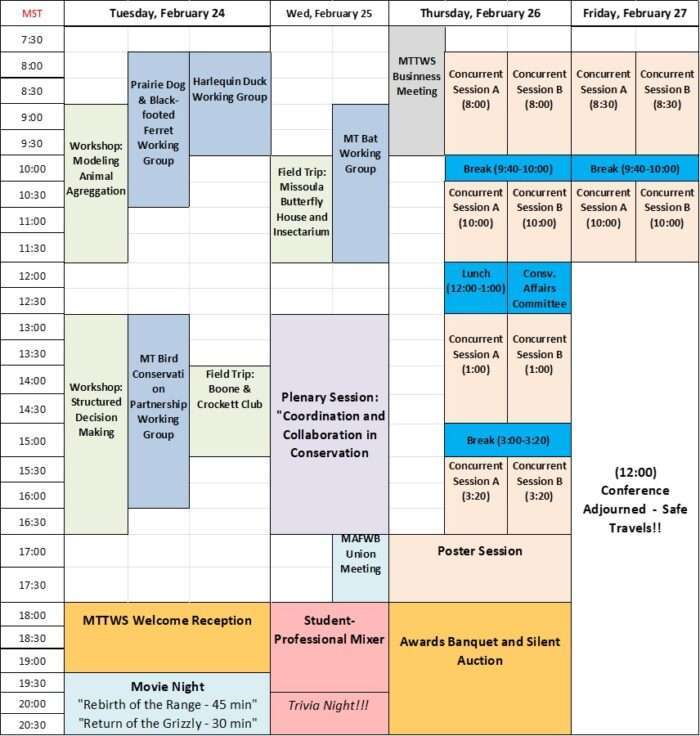
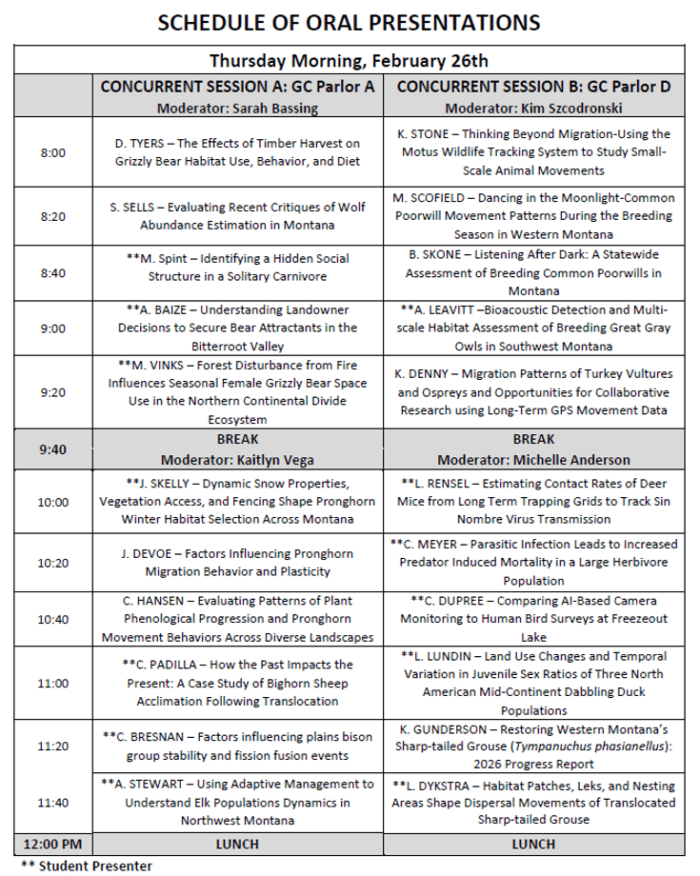
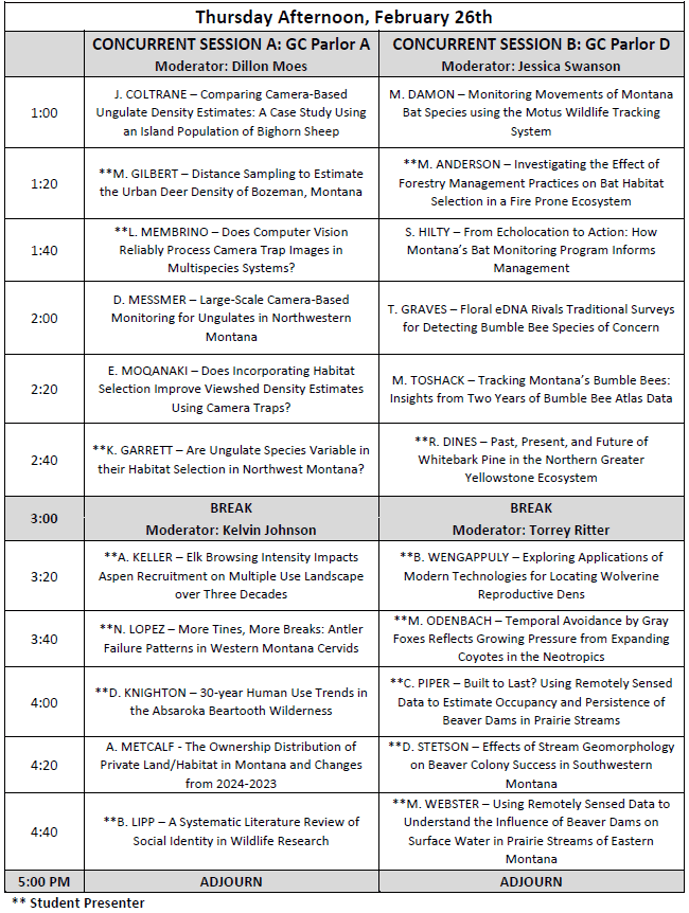
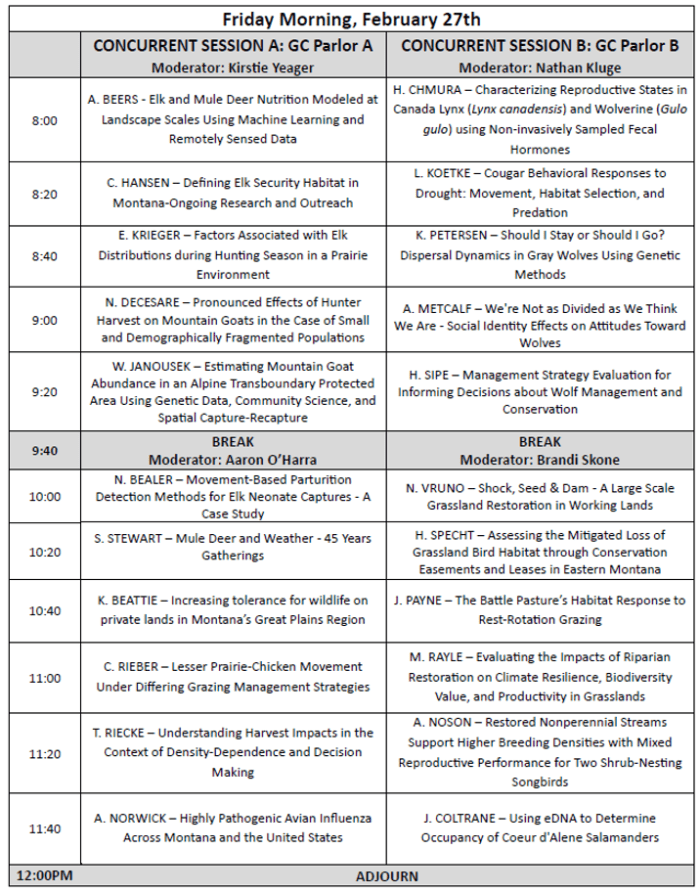
Small Grants
Application period now closed
Award Nominations
Nomination period now closed
President-Elect Candidates
Justin Gude & Kristina Gunderson
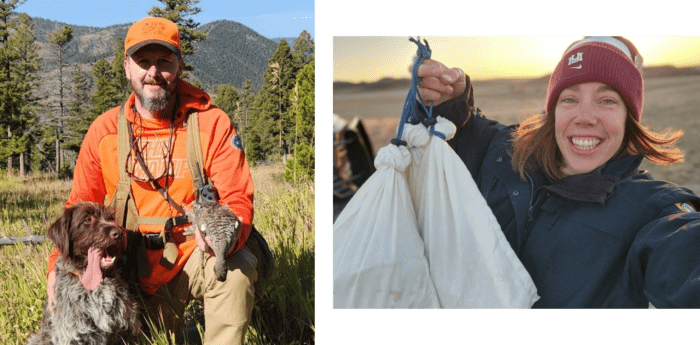
Kristina grew up in Carnation, Washington camping, fishing, rock hounding with her family and generally cultivating a passion for wildlife. She was awarded her B.S. in Wildlife Biology from University of Montana, where she was the Student Chapter of TWS secretary and vice president 3 years collectively. She spent a stint of time in Laramie, Wyoming investigating niche partitioning and community ecology dynamics in small mammals throughout sagebrush and prairie grassland ecosystems. She was awarded her PhD in Ecology from the University of Wyoming in 2022. While completing the final few years of her dissertation she lived in a remote community on Prince of Wales Island in Alaska. She moved back to Missoula, Montana in 2022 and began her career in Montana Fish, Wildlife and Parks (FWP) in 2023 as a field coordinator for the Western Montana Sharp-tailed Grouse Reintroduction Project.
Throughout her career in wildlife, Kristina has developed an interest in supporting new professionals to keep the conservation and passion for wildlife strong in future generations of wildlife biologists. She’s helped organize a grass-roots conference on black-tailed deer in Alaska and overseen the logistics of large TWS events for student chapters as a student and a mentor post-undergrad. Through her career, especially in her current role, she’s worked with ranchers, private landowner, FWP peers, federal and NGO biologists, academic partners and the general public. Following these experiences she’s developed an interest in community-led, agency-supported conservation to encourage passion for wildlife conservation in the general public. Kristina has been a member of TWS for the past 15 years and has been constantly amazed at the passionate effort towards research and conservation she’s seen accomplished through dedicated wildlife professionals.
Kristina would love the opportunity to be further involved at the state chapter level of TWS. Especially in Montana, which has been an un-paralleled community to work in during her career. She enjoys spending her free time hunting and fishing with her friends, hiking with her dogs, and finding all possible wildlife-experience opportunities to do with her daughter.
Justin is the Research Administrator for Montana Fish, Wildlife & Parks, where his role is to coordinate, manage, and deliver the agency’s research, biometrics, decision support, and genetics programs to support fish, wildlife, and recreation management and policy decisions. He previously worked as the Wildlife Research & Technical Services Bureau Chief and Wildlife Biometrician for FWP, and prior to that as a Wildlife Biologist for the U.S. Fish & Wildlife Service in Alaska. As with most wildlife professionals, he spent years working seasonal jobs that took him from southern Chile to Florida to northern Michigan and Minnesota to Alaska. In what now seems like a lifetime ago, he earned an M.S. From Montana State University in Fish and Wildlife Management and a B.S. from the University of Florida in Wildlife Ecology and Conservation. He is a National Conservation Leadership Institute Fellow, Cohort 8 (2013-14), and he earned an Expert Certification in Decision Analysis from the U.S. Department of Interior in 2019.
Justin is from Florida and while he technically bleeds orange and blue, John Steinbeck articulated it best: “For other states I have admiration, respect, recognition, even some affection, but with Montana it is love.” Justin lives here because of the wildlife and outdoor opportunities we have; he is an avid bird hunter (and dog lover), big game hunter, backpacker, hiker, fisherman, rafter, skier, and he even loves to operate 4WD trucks, ATVs, and snow machines. Justin has been asked many times what his favorite animal or taxa is and finds it to be a most difficult question because he is fascinated by all animals, including humans. He has worked on many kinds of birds (his first, “gateway” taxa), small mammals, ungulates, and carnivores of all sizes. He has also worked increasingly on humans (social science, psychology, and even economics). Over time he has become less able to separate the human and natural worlds, whether human society can recognize it or not, and he has seen how fundamental wildlife and the outdoors are to human mental, physical, and societal health, and vice versa. Justin is driven by and committed to a life of service to the wildlife, outdoor opportunities, and people of this state. The Montana TWS Chapter and its members have been so important at every step of Justin’s career and life journey, as a venue for learning, debating and discussing ideas, mentorship, and community, and he wants to help ensure this organization continues to play these important roles into the future.
Submit Photos for our Slideshow
Please share photos with us of conservation collaboration in action!
Photos of people, places, or wildlife actively engaging in or benefiting from collaborative conservation would be ideal. We will display photos as a slideshow at the 2026 TWS conference. Thank you for helping us celebrate success!
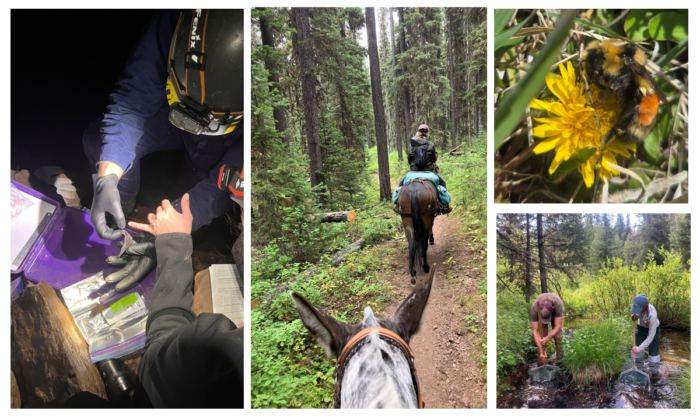
If you have issues submitting you can also send photos to mttws.secretary@gmail.com
